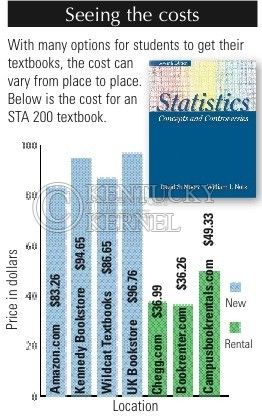Borrowing Socrates: Textbook rentals gain popularity for cost cutting

January 27, 2010
As tuition, housing and other student expenses are continuously rising, many students have turned to renting textbooks to help cut costs.
CampusBookRentals.com began in 2007 and is viewed as one of the pioneers in textbook renting. The site has the nation’s largest selection of rentable textbooks, accommodating students on more than 5,000 campuses.
Alan Martin, CEO of CampusBookRentals.com, said by renting textbooks, students can keep their money to use on other needs.
“The biggest benefit is that you save money upfront,†Martin said. “It’s the same reason you would rent a video instead of buying it. It helps students keep cash upfront to use on other expenses.â€
According to a poll issued by the company, Martin said the average savings for students who rent as opposed to buy is around $250 a semester.
“Students have consistent savings when renting, and you’re always going to save at least half of the price the books normally sell for,†Martin said.
However, some bookstores selling textbooks instead of renting argue the savings is little to nonexistent.
“For a simple example, say a new textbook sells for $100,†said Carol Behr, general manager of Kennedy Bookstore. “Rentals typically charge 42 to 46 percent of the sale price, and at the end of the semester there is no option to keep it. If we know the professor will be using the book next semester, we’ll buy it back for half the original price, in this case $50.â€
Behr said Kennedy’s looked at a contract for renting books at the beginning of Fall 2009, but felt it would serve no benefit for students.
“There are hidden policies and stipulations, such as what condition the book must be returned in, and if it is lost or stolen, the student may find themselves paying double the original price,†Behr said. “There was a trend in renting 16 to 20 years ago, but it didn’t work well because of obstacles that came with it. Now, with the current economic situation, students are starting to explore renting as an option again, but it’s not economically viable.â€
Despite the upfront savings in cost, some students still prefer purchasing textbooks over renting because of the freedom ownership allows them.
“The reason I don’t rent is because I like writing in the books and using them in the following semesters,†said electrical engineering sophomore Philip Morris. “Many of my books follow directly into the new courses, so it’s good to be able to look back at old rules.â€
Although Kennedy’s currently does not offer textbook renting as an option, they haven’t dismissed the idea entirely.
“I won’t say that we’ll never rent textbooks,†Behr said. “If it seemed like a viable option that would help students and became very popular, then we’d probably do it.â€































































































































































